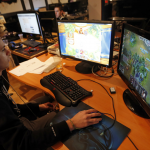 I recently watched a toddler in a TV shop try to the swipe the on-screen graphics on the rolling news being played. He got really frustrated, not understanding why ALL screens are not touch screens and fully interactive. He could barely walk and certainly couldn’t write.
I recently watched a toddler in a TV shop try to the swipe the on-screen graphics on the rolling news being played. He got really frustrated, not understanding why ALL screens are not touch screens and fully interactive. He could barely walk and certainly couldn’t write.
It’s a great reminder that today’s kids (the so called Gen Z) are growing up in a truly connected and interactive world, and will grow up steeped in the internet– far more so than even the most tech savvy twenty somethings (Gen Y) we have working for us now.
So what might be the implications for the swipe-before-you-can-write generations when it comes to their expectations of adulthood and work?
If you spend a life online, there are certain characteristics of that experience that might shape your expectations of life in general and work in particular.
Let’s call them Gen Z’s Internet-derived expectations
These might include:
- All ideas compete on an equal footing on the internet – it’s the contribution that matters, not the credentials of who said it. If it’s a potent contribution, it gets picked up and amplified online.
- Leaders serve rather than preside – Hierarchies form online just as they do in the real world, but the ‘leaders’ float to the top naturally, because they deliver a leadership ‘service’. When they stop delivering that leadership service, their star wanes and someone else floats to the top.
- Everything is voluntary online – no one is paying you or asking you to do anything; yet people still engage and participate energetically. For generation Z work might not necessarily just about pay and rations, but doing work they love, playing to their strengths and the wider employee value proposition (EVP).
- Groups are self-defining and self-organising and resources get attracted not allocated. There is no one controlling how people come together to create something (a wiki article for example) but people simply find others with the same common goal and work together.
- Tasks are chosen not assigned. As with number 4 above, tasks get done by someone who volunteers their time. This might not be a way to run an organisation if you haven’t got the right people who pick up all that needs doing, but if you do, it ensures that people truly do the work they love and play to their strengths.
- Power comes from sharing information, not hoarding it. The web is all about sharing. Gone are the days when knowledge is power. Now power and influence is given to those who share liberally and freely, for example prolific re-tweeters who collate and share content of interest to their followers (audience). Sharing can also involve rule and law breaking too – peer-to-peer music sharing and WikiLeaks come to mind.
- It has to be mobile and cloud. For Gen Z access to the internet is ubiquitous, 100% mobile and 24/7. For them, a desktop might be totally alien. Any bit of tech at work is likely to be far inferior to what there have in their pocket.
- Everything is connected – the so called ‘internet of thing’s’ where everything from your telly to you fridge is connected and providing information. And everything knows where it is (because it has an inbuilt GPS). Having to tell anything where you are will seem odd – think booking a taxi with Uber – the taxi just knows where you are.
What does this mean for organisations and leaders?
If growing up fully ‘online’ creates these or similar expectations of work, it raises some interesting questions for organisations and leaders.
- If Gen Z come into the workplace expecting all or even some of these qualities, what would happen?
- What would an organisation that could deliver on these qualities look like? Do any exist now?
- Which qualities are compatible with your business now, or the business you need to morph into?
- Which ones of these will NEVER be compatible with your business? Are you sure?
These and similar questions are ones that forward looking organisations and leaders are asking and planning for. Often the driver for change right now has been thinking about customer’s expectations changing, but that doesn’t really shape the organisation in the long term. By anticipating the changing expectations of the future employees you adapt its DNA to thrive.
If you’d like to inspire and enable your leaders to better engage their teams by embracing the future of work, then call Simon on 020 3488 0464 or email simon@simonwalker.org








